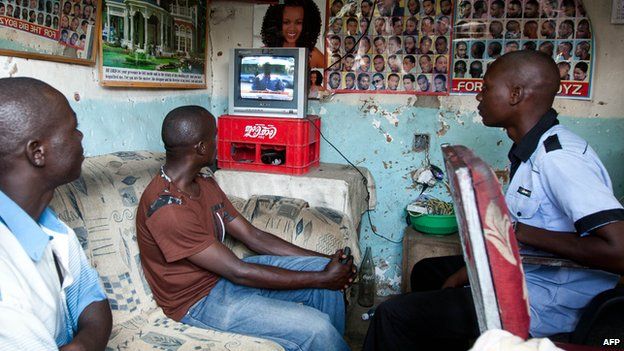
-
12 March 2015
- From the section Africa
- comments

In our series of columns from African journalists, broadcaster and media trainer Joseph Warungu reflects on the return of politicians to national television screens after a three-week break.
Kenyans are great runners.
Normally they tend to run towards something – a gold medal, a cash prize or even fame and glory for self and country.
But over the last three weeks they have been running away from something – politicians.
Historically Kenyans have neither trusted nor loved their politicians – often with good reason.
You vote them into power and they disempower you by creating laws and policies that severely restrict freedoms and impoverish the nation.
You give them access to parliament and they give themselves hefty perks and pay.
You focus them on the people’s actual concerns, but their biggest interest becomes prime public land, prompting their mouths to salivate with desire.
So when the three most popular national television stations, Citizen TV, KTN TV, Nation TV, and its subsidiary Q-TV, switched off their broadcasts in a row over the move from analogue to digital transmission, most Kenyans were relieved to see their politicians wiped off their screens.
The political vitriol and vanity that had become a staple diet for TV consumers took a break.
One young office receptionist told me: “I haven’t heard any silly politics in three weeks, I didn’t realise that it’s politicians who force it on my screen.”
Honourable?
Shortly before the big TV switch-off, the level of political debate in parliament had been lowered to unbelievable levels.
In one instance, the lawmakers spent days discussing and then approving a bill banning elected governors, who head the country’s 47 counties, from being referred to as “excellency”.
Yet these honourable members saw nothing dishonourable about exchanging blows live on TV in parliament, nor fuelling violence during their various party elections.
While all this was going on, the critical issues that ordinary citizens were focused on, such as persistent insecurity and the current drought that is threatening hundreds of thousands of people, remain unaddressed.
It is known all over the world that politicians need the oxygen of publicity to survive.
And so the Kenyan species refused to go away quietly.
Many politicians criticised the government for failing to give the TV stations adequate time to prepare for the move to digital transmission.
“This is a grave matter of this nation,” one opposition MP said. “We should not be taken back to pre-1990 where Kenyans were forced to watch [the state-owned] KBC.”
Some of the politicians went as far as urging Kenyans to stage street protests demanding the resumption of TV broadcasts.
But their pleas failed to persuade the Communications Authority of Kenya to change its mind and reconcile with the TV stations.
And so for three weeks, Kenyans got away from their politicians, who were restricted to radio and newspapers where they seemed less overbearing and tiresome.
Joseph Warungu:
“If you are vaguely important in Kenya and happen to die, rest assured that your funeral will be turned into a shameless political arena”
In a newspaper photograph, a politician’s lips are stuck together; on radio their space-demanding bellies cannot sway.
But politicians have creative moves for survival and this peace and quiet did not last long.
When the television stations went off the air, they took over dead spaces – the funeral platform.
If you are vaguely important in Kenya and happen to die, rest assured that your funeral will be turned into a shameless political arena.
It is common practice for politicians to turn up at funerals and then queue up to give long speeches that neither eulogise the dead nor console the bereaved, but instead promote their agenda and attack opponents.
So prevalent and insensitive is the practice that one former MP, Kuria Kanyingi, took the precaution of banning political speeches at his funeral.
Mr Kanyingi, who before he died late last year was a highly active fundraiser for the former ruling party Kanu, had left very clear instructions that upon his death no political oratory should be allowed during his burial.
‘Out of tune’
But if the dead will not play ball, the politician can always turn to the living for publicity.
Some are now very quick to invite successful Kenyan musicians to attend their birthday parties or other events, hoping that the brand association will earn political mileage.
And when this does not work, the politicians have no qualms about singing in public, out of tune and out of pitch, or stooping low to join children dancing at public events – their giant frames swinging this way and that.
A number of politicians own radio stations in Kenya, and so if everything else fails, they can always rely on “home” coverage.
With all the TV stations now back on air, and the politicians’ air supply restored, Kenyans were hoping that the lawmakers would look beyond their bellies to craft policies that would deny poverty the oxygen it needs to drain away the lives of ordinary people.
However, when I watched my TV the other night, my heart sunk.
The traditional menu was back – complete with scandals of some politicians grabbing land and allegations of others receiving kick-backs to “doctor” an unfavourable audit report.
Kenyans, it seems, will need to keep running – somewhere, anywhere.
